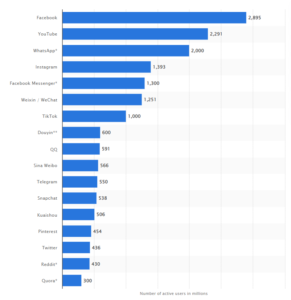With the recent drop in Meta stock, investors have had to take a step back to re-assess the company’s future. What was not long ago a trillion-dollar company now trades at a 15 times earnings multiple.
Mark Zuckerberg has a history of pricey acquisitions but ultimately success in the social network space. As Meta’s legacy platforms are threatened by bad press, privacy regulation, and other competitors, a rebranding into the Metaverse seems to be Mark’s idea of a way out.
The missing link that Metaverse Platforms doesn’t seem to realize is that content is key.
Meta needs software to compete
From looking at the success of the other FAANMG companies it is clear that true competitive advantage comes from having platforms and content. A platform locks users into the software. Think about how Apple controls the iOS environment or Microsoft with Windows.
The more users that end up in the environment the more power the company has.
Just look at how a simple change in Apple’s privacy policy has cost billions of dollars to its competitors. In the guise of “protecting its consumers” Apple managed to take out a blue-chip company’s worth of revenue. That is the true power of owning a platform.
Apple, Microsoft, and Google control the largest share of operating systems for the world’s devices. When someone builds an app, software, video game, online content, whatever it may be, they rely on an operating system to create it and share it.
That gives these companies ultimate control over pretty much the entirety of the internet.
If Meta wants to root itself deeply into the Metaverse they will have to create a platform such as that.
Content is the bread and butter of the VR experience. At the moment video games dominate the VR world. Virtual reality meetings are failing to catch on when Zoom works just fine and even those are dreaded. Because of this, a solid content platform is key.
Microsoft seems to understand the importance of content
Microsoft’s acquisition of Activision is a key example. Microsoft is already deeply embedded into video gaming through Xbox and most gamers prefer the Windows operating system.
At its core, Meta is a social network company. Its biggest successes have come from its social network platforms. Statista published a report last year on social networks ranked by the number of users.

As of October 2021, Meta held 4 of the top 5 spots: Facebook (2.8 B active users), Whatsapp (2B), Instagram (1.4B), and Messenger (1.3B).
While the number of users is impressive, this type of model is quickly being regulated away as consumers become warier about their privacy.
Meta relies on user-generated content
Its business model relies on content created by its users. Meta provides the medium all the while collecting massive amounts of behavioral data. Its recent earnings miss shows the fragility of this business model.
Apple’s update to its privacy policies hurts Meta deeply. Their lack of control over the platform on which their apps are based puts them at a grave disadvantage.
Building everything from scratch
In comes the rebranding. Meta plans to spend $10 billion this year -- and even more in the following years -- to develop its virtual reality hardware, software, and content for the Metaverse.
The first-mover advantage comes at a huge cost. Building the software and infrastructure from the ground up will take years to refine into something people are excited about.
Meta’s competitors can just wait out and insert their content and intellectual property once it’s built. If the Metaverse flops they keep their content and move on with minimal costs.
Meta’s $2 billion purchase of Oculus gave us a glimpse into the costs of competing in the metaverse. That was his first hint at repositioning into the Zuckerverse. Oculus is a huge asset for Meta’s future but the headset hardware alone is quickly falling into the mix.
Competitors are moving in
Sony has come out with the Playstation VR, HTC has Vive, and even Nintendo sells a headset -- although Nintendo’s is more of a cardboard box to strap your Switch onto your head.
The ease of entrance into headsets is still the most notable weak point. Nothing will stop other companies from spending a little more money on research and development to create a headset for themselves -- after all, it’s just a screen strapped to your head.
Why the long-term VR play is software and content
For the VR play to work long-term, owning software in which games can be built would be a huge asset for Meta. Developers would rely on the platform and the ease of creation would lead to a flood of content for Meta to control.
3D spaces are a possibility and it lines up with Meta’s model of social networking. These virtual spaces would likely end up having some form of advertising.
While you’re walking around a virtual park you see billboards and pop-up ads streaming across your view. It’s a dystopian picture but any virtual reality platform will likely rely on advertisements for revenue.
The metaverse is still in its infancy, and over time content will be a key component of the virtual reality experience. As more users start to embrace it, virtual reality is an industry that is poised for growth. It is also an obvious way of monetizing the platforms created.
Monetizing the metaverse
Information technology companies have become so profitable because of their ability to improve advertisement performance. The massive collection of data led to the greatest creation of wealth in this country and its no question why those companies are so valuable. It’s hard to imagine a profitable version of the Metaverse without some form of advertisement, subscription model, etc.
The question then becomes if the price tag for transforming the company can actually be justified. Meta has a history of small start-up acquisitions for the purpose of bringing on engineering/computer science talent.
Large purchases like Whatsapp and Instagram were much more focused on adding fundamentally to the company. Oculus was among the string of acquisitions in 2014 and could very well be as successful at generating revenue as Instagram and Whatsapp.
However, Hardware is new territory for Meta. Transitioning Oculus to a software platform makes the most sense.
Conclusion
Meta is at a turning point. Its legacy business can support its ventures but the ultimate success or failure will come from its movement into virtual and augmented reality.
The future of online interactions, gaming, and content is rapidly changing.
Who knows what will come in the Zuckerverse?

